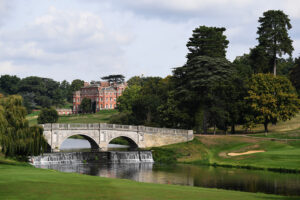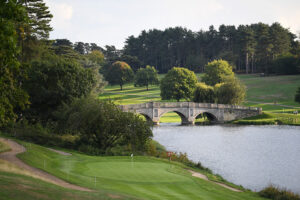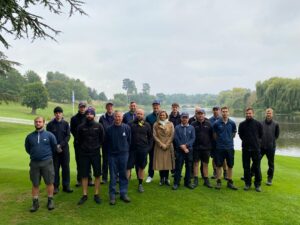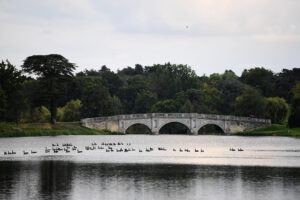Meet the golf course manager: Jonathan Taylor
Related Articles
From Brocket Hall in Hertfordshire, Jonathan details how he dealt with the 2022 drought, hosted the Rose Ladies Series at short notice and has responded to a huge increase in footfall in the last three years.
The parkland site at Brocket Hall in Welwyn Garden City dates back to 1239 and its two golf courses, The Melbourne Course, designed by Peter Alliss and Clive Clark, which opened in 1992, and The Palmerston Course, designed by Donald Steel and Martin Ebert, which opened in 2000, are named after prime ministers who lived on the estate. Both courses are highly rated.
We speak to their course manager, Jonathan Taylor, about maintaining an incredible venue.
Could you tell us about your background and your career path to your current role as golf course manager at Brocket Hall?
I got into the industry as a 15-year-old at my local club, The Manor Golf Club in Kingstone, Staffordshire initially watering the course in the summer months over the school holidays. I was then given the opportunity to take it on when not at school. It was at this stage that I fell in love with the game of golf and all the maintenance practices that go into preparing a golf course. When I finished school, I undertook an HND in horticulture at Rodbaston College before enrolling on the Bsc (Hons) in Sportsturf & Golf Course Management at Myerscough College. I met some industry friends there and was lucky enough to receive an R&A scholarship. On completion of the degree, I travelled out to the United States on the Ohio State Internship Program for 12 months, working at the Robert Trent Jones Golf Club in Virginia, and then at Quail Hollow Club in North Carolina. During this time, I gained experience at the PGA Championship at Oak Hill CC, and PGA Tour events at Congressional CC and Quail Hollow.
In my time at Robert Trent Jones I was offered an assistant superintendent position working in a large team of 40 led by superintendent Scott Furlong. This gave me a huge opportunity at just 22 years of age and I will be forever grateful for the impact Scott had on my career to date. Then in 2016, a position presented itself for me to travel home to take up the position of head greenkeeper working at The Grove, just down the road in Hertfordshire, with another great mentor in Phillip Chiverton. I worked closely with Phillip for five years before moving to my current tenure as golf course manager at Brocket Hall. A beautiful 600 hectare private estate with two championship golf courses, an academy and par three course, run by a dedicated and talented team of 20 and growing.
Being based in Hertfordshire, the drought of 2022 must have had an impact. How did you cope?
The summer of 2022 is not one I would like to live again! The pressure was relentless throughout and we drew on every ounce of man hour we could get our hands on! We had 54 days of no rain, losing roughly 250mm of ET (evapotranspiration) in that time. Our irrigation system is quite old and struggles to keep up with the demands of the business. We hold 30,000m3 for use during the summer which doesn’t go very far in summers like we just had. We had to be selective with our irrigation programmes from the outset as we have no access to mains water once our irrigation reservoir is dry. Fairways were on a reduced programme from May and we ended up shutting off tees and approaches in July to ensure we had enough for our greens programmes and hand watering. By this stage the irrigation water was stagnant and warm, not ideal for showering our most important asset with! We did what we could through hand watering to preserve water and the use of wetting agents across all surfaces which helped keep some turf health. We did see an increased pressure of anthracnose through the summer which wasn’t surprising considering what we were battling, and we probably lost between 30 and 40 percent of grass coverage (mainly poa) on fairways, tees and approaches. A purchase of a Vreddo seeder in August was very much welcomed as we transition to more drought resistant species on key surfaces.
How does having high-class events like the Rose Ladies Series [held in September 2022] affect your work?
Firstly, it was great to be able to showcase Brocket Hall and the Melbourne Course, as well as giving the team a target to work towards after a long hard summer. We had a really short lead time of six weeks to the event, so it was really all hands-on deck to try and get the course back from the summer drought to tour standard for the LET Access Series players. Normally we would have more time for agronomic planning to have the conditions peaking for tournament week and additional time to arrange tournament support through machinery and volunteers. In the short window we prioritised the key areas and worked our way back from the event date mapping all of our chemical applications and in this case A LOT of seed. We were fortunate as we got some rain just at the right time; this really kicked things off in a big way. The team worked tirelessly to get us to the stage we were for the event, not perfect but we did everything we could do. During this time of increased workload all the other details still required attention such as looking at areas for spectator access and safety, positions for on-course cameras, course length, tee and pin locations to get every detail right and for the course to be where the LET Access Series required. Tournament weeks are long but rewarding; we did morning and evening shifts and each evening we had a team barbecue at close of play to bring everyone together and draw up the operation for the next morning. The week was a huge success, conditions were tough for scoring with a -2 score leading come the end of play on Sunday.
What growth has the club seen by way of members and play since the pandemic started, and what challenges has this brought?
The club has gone from strength to strength since the pandemic and we have definitely benefited like many others in the boom the golf industry has received. We now have over 1,000 members, which is an increase of around 600 from pre-pandemic levels. This has brought about its own challenges as we have an increased number of rounds meaning busier tee sheets and more traffic around both golf courses. The increase has allowed us to upgrade various parts of our operation to ensure the increased number does not have a detrimental effect on the players’ journey and membership service. There are now more staff around the estate and courses, some upgrades have allowed us to now hand cut greens reducing wear and compaction on key surfaces as well as sanding walk ways – all things that wouldn’t have been viable with our pre-pandemic numbers.
Crane fly larvae have been a major issue on UK golf courses lately, has this impacted you and how have you dealt with it?
Crane fly have not been a major issue at Brocket Hall as of yet as the previous course manager did a great job of suppressing numbers to avoid damage. We have a preventative plan moving forward with nematode applications in the spring and autumn to target chafers and crane fly should we need them. As long as we have our finger on the pulse and don’t rely on the last two years data and have a budget to keep ourselves covered, we should hopefully avoid any serious damage.
What do you find most rewarding about greenkeeping and what has been your biggest challenge to date?
There are so many things that are rewarding about this industry, from hosting events on the various tours, to receiving great feedback from members, their guests and event organisers. It is also so rewarding bringing new faces into the industry and seeing them grow and take on bigger roles. We now have four apprentices at Brocket Hall all newly recruited in the last year. We will throw as much training and development their way as they are the future of the industry.
I think the biggest challenge is climate change and the effect this is going to have on businesses from now on. A lot of our armoury has been taken away and we have to find new ways to do our job. We as an industry will need to continue to be innovative and use modern technologies to better do our job. The summers are getting hotter and drier, the winters milder and wetter and storms more severe. Investments will need to be made across the board that protect us from summer stress, strong winds, heavy rain and mild weather in December.
What are you working on at the moment and what other projects have you got planned for this year?
We have had architects out for both courses in the last couple of months. The Melbourne Course is being overseen by Guy Hockley of Golden Age Architecture and The Palmerston by Mackenzie & Ebert. This has helped us to start to plan the estate’s development over the next few years. An updated and efficient irrigation system is a must for us to be able to produce world-class playing surfaces year-round.
In the spring we replaced the bunkers in the Academy area using Capillary Concrete and China clay sand as a test bed for members and ourselves with a view to considering them for the course as our redesign plans progress.
We have also started a woodland management programme in the last 12 months as the estate has a lot of veteran trees, but also a lot of areas of densely populated woodland with dead, diseased and damaged trees which have required urgent care. These areas are being tackled as well as moving some desirable species with a tree spade and beginning a planting scheme across the estate.
Our application to be GEO certified is underway as we prove ourselves to be environmentally conscious, sustainable and continue to come up with new initiatives to manage our property.
What advice would you give to anyone thinking about entering the profession?
Firstly, I couldn’t imagine doing anything else. I would say work as hard as you can and don’t be afraid to get stuck in, ask questions and soak up as much knowledge as you can from your mentors.
Keep learning and back up your practical knowledge with education as you will find this opens up more doors to scholarships and further networking. There are so many opportunities from working at the world’s best golf courses, working major tournaments and networking with many great people. What is not to like?































